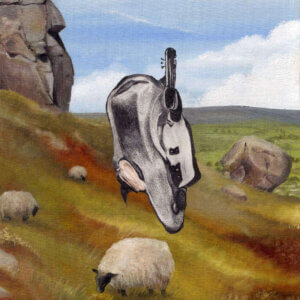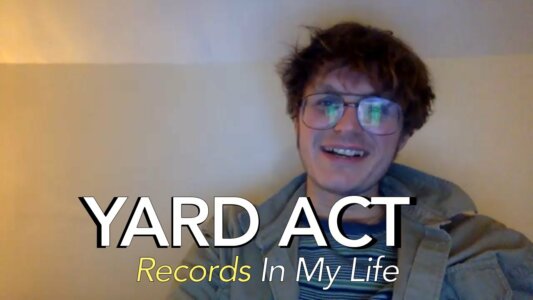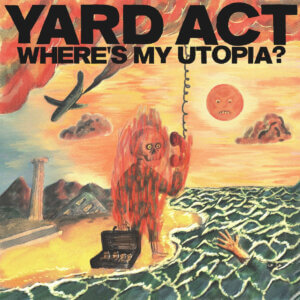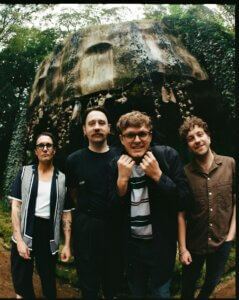Yard Act Stay Vigilant
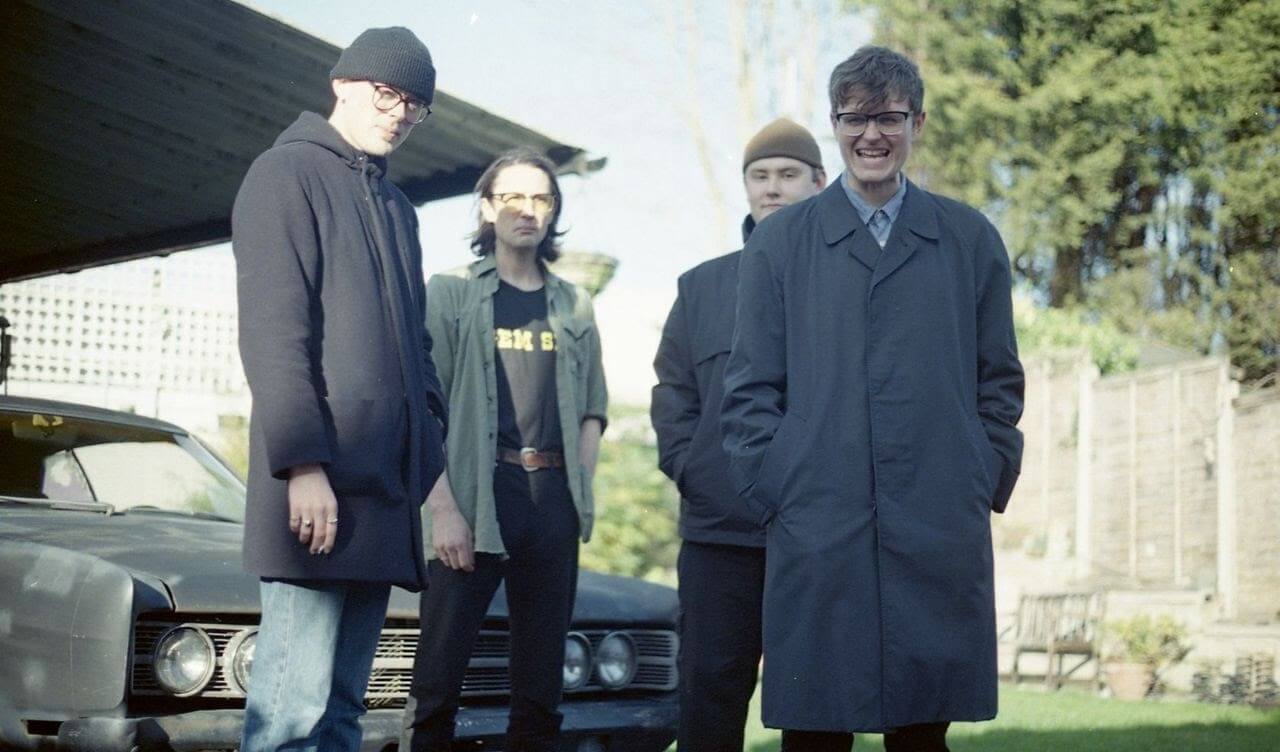
Like many of their contemporary punk compatriots, Leeds rockers Yard Act are reckoning with the divisive social and political issues plaguing England and beyond today. Brexit, the Conservative Party’s anti-refugee policies, and the government’s mishandling of the pandemic all fall in the band’s crosshairs on their spiky, slinky, and twisting full-length debut, The Overload, out January 21 on Island Records. But Yard Act shoot around their targets. At the risk of appearing to play it safe or sit on the fence, they refuse to bludgeon listeners with on-the- nose screeds, to partake in the type of overtly partisan megaphone-yelling that accomplishes
little, if anything. Singer and lyricist James Smith animates Yard Act’s songs with character studies that leave it up to listeners to form their own impressions. Latent sympathies are as likely to surface as latent prejudices.
Yard Act emerged from a verdant DIY culture. As the band’s bassist, Ryan Needham, told Northern Transmissions over Zoom, in addition to a healthy number of non-profit venues, Leeds boasts a large student population concentrated in terrace houses in the neighbourhood of High Park. “So there’s a lot of house parties and DJing,” he explains. “There was a time in the mid- 2000s when I first moved here where pretty much every single one of those student houses had a drum kit and a PA system in the basement. It was pretty fertile in terms of guitar music.”
Leeds has a rich history of guitar music. Post-punk luminaries like Gang of Four, Delta 5, and the Mekons sprang from the same soil that gave rise to Yard Act decades later. It’s no surprise, then, that the younger band falls within a similar sonic sphere as its predecessors.
But Needham, Smith, and their other bandmates, guitarist Sam Shjipstone and drummer Jay Russell, take influence from a far broader palette of genres. Britpop’s cleverness and Tom Waits’ lurid portraiture seep into Yard Act’s music. The hypnotic, mechanical drum beat of “Fixer Upper” atop cowbell and a trebling, swirling bass pattern, as well as the persistent thump of “Dark Days” over slicing guitar chords, emulate ’70s disco—or, for more modern reference points, dance punk acts LCD Soundsystem and the Rapture. Undeniable funk influences peek through “Payday.” “Peanuts” and “The Trapper’s Pelts” feature spoken interludes that call to mind hip hop skits; the latter plays like a high-energy Gorillaz jam complete with filtered vocals akin to Damon Albarn’s.
Needham, in particular, developed a growing interest in dance punk and no wave, from Liquid Liquid to the artists showcased on the seminal 1978 compilation, No New York, curated by Brian Eno and featuring DNA, James Chance and the Contortions, and Mars. An interview with Rapture singer Luke Jenner encouraged Needham to also delve into mid-2000s music like the Strokes and Arctic Monkeys. The first incarnation of Yard Act, featuring Needham, Smith, Sammy Robinson on guitar, and George Townend on drums, was much more abrasive than the tightly wound foursome that comprise Yard Act today. “There’s a few hints of it,” Needham admits of no wave influence on present day Yard Act, citing the simple bass lines of “Rich,” “but it’s definitely not as abrasive as what we were going for early.”
Some of Needham’s early experiences in other bands have left longer lasting impressions on Yard Act—and perhaps more valuable ones as well. Prior to forming Yard Act, all its members played in numerous other groups. Needham found success with Komakino, who took the stage at major festivals including Reading and Leeds. His time in Komakino prepared him to avoid missteps. “That first band I was in when I was 20, we had a big management company, and we were courted by all the labels, same as we’ve just had with this band. But we waited too long, and we missed our little window [of opportunity].” But it also taught him not to count on expectations. It made him conscious of the mysteries of connection and chance encounters. “You can never predict what’s gonna connect with people. When faced with a crossroads, decisions to be made is not always clear. A lot of with what connects and what works seems to
be a bit of a dark art.”
Mainly, Needham says, “I’ve been in bands now for 20 years. I feel like I’ve been very idealistic. I come from a real DIY background, and now we’ve just signed with Island, who are part of Universal. So I’m learning to not be quite so idealistic and be open to things is a thing that I’ve picked up along the way.”
Whatever it is that makes Needham, Smith, Shjipstone, and Russell such a formidable team, it’s been a learning experience for Needham. For one, he’s accustomed to fronting bands. Secondly, “I’ve never been in a band that’s so lyrically [focused]. Writing lyrics was never a thing I loved,” he admits. “I wrote more abstractly, more flowery, I guess, whereas James—he’s brilliant—he’s got a very definite thing, and he has a lot to say. It’s the first band I’ve been in where the vocals have to be up front and centre.”
Needham, Russell, and Shjipstone build their songs around Smith, leaving ample space for his words to flourish. “There’ll be songs that are 13 bars long just because that’s the way the lyrics pan out. I’ve tried to do more classic songwriting in previous bands, but this one, James and I sat around a computer, I’d send drum and bass loops, and James would put a vocal over the top, but he’d chopped that up. So we built it a lot like electronic music or hip hop,” Needham explains, calling back to the band’s vast influences. “And Sam would weave his guitar in and around James’s vocals. It was very much harnessing what James was doing and taking a bit of back seat.”
Yard Act have no intentions of taking a back seat in 2022—pandemic restrictions pending. On the heels of The Overload, Yard Act are looking forward to a European tour. They’re also hoping to pull off an American trek bookended by dates at SXSW and Coachella. And Yard Act are primed and ready to go. They’ve kept their skills sharp, playing, Needham estimates, as many as 30 shows over the summer. With only three DIY shows in front of 30 people under their belts before the pandemic, they’ve since catapulted onto festival stages and into sold out venues in the UK.
“Looking back, I don’t really know how it happened,” Needham reflects in amazement. “Again, you don’t know what’s gonna connect.” But he has a hunch that the tentative holding period when many artists pumped the brakes on their activities gave Yard Act an advantage. “No one was putting anything out into the world, and we had the album ready to go, so we were like, ‘Oh, let’s just do it.’ We just wanted to keep moving.”
Reflecting further on Yard Act’s whirlwind of activity kicking off their new year, Needham says, “I’ve released records on various independent labels but never worked with a major label before. Seeing the way these last two weeks have panned out, it’s like, ‘Oh, this is how they fucking do it!’” With ample time between completing The Overload and releasing it, Needham found himself catching up on email threads he likely wouldn’t have otherwise. “And I’m like, ‘This is fascinating!’ I’m not saying I’m going to be massively invested in knowing all the ins and outs of the business side of it,” he reassures, “but it’s good to be not completely ignorant to what’s going on.”
Order The Overload by Yard Act HERE
Latest Reviews
Tracks
Advertisement
Looking for something new to listen to?
Sign up to our all-new newsletter for top-notch reviews, news, videos and playlists.





